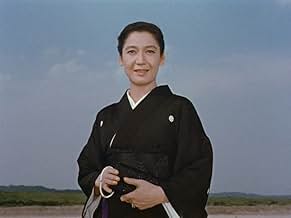Füge eine Handlung in deiner Sprache hinzuThe family of an older man who runs a small sake brewery become concerned with his finances and his health after they discover him visiting an old mistress from his youth.The family of an older man who runs a small sake brewery become concerned with his finances and his health after they discover him visiting an old mistress from his youth.The family of an older man who runs a small sake brewery become concerned with his finances and his health after they discover him visiting an old mistress from his youth.
- Regie
- Drehbuch
- Hauptbesetzung
- Auszeichnungen
- 1 Gewinn & 1 Nominierung insgesamt
Empfohlene Bewertungen
Ozu returns to familiar territory, including marrying off unwed relatives, familial obligations balanced against personal fulfillment, and the simple pleasures of domestic life. It all looks nice, each shot meticulously composed, and with added attention to ambient sound effects, like the sound of crickets chirping in the afternoon. Ozu only directed one film after this, 1962's An Autumn Afternoon, before dying in 1963 at age 60. His frequent star, and a major Japanese film fixture of the post-war years, Setsuko Hara, would also only appear in one more film, 1962's Chushingura. She lived in retirement another 53 years, passing away in 2015 at the age of 95.
There is no Ozu film nearest Sirk's or Minneli's universe like this one.
Wusstest du schon
- WissenswertesThe last of six collaborations between Yasujiro Ozu and Setsuko Hara.
- Zitate
Kitagawa Yanosuke: We humans can't come to terms with death until it's too late. Even people like my brother, who did as he pleased. On his deathbed, even Toyotomi Hideyoshi said: "It's as if my glorious life was but a dream within a dream."
- VerbindungenReferenced in Ikite wa mita keredo - Ozu Yasujirô den (1983)
- SoundtracksIn a Persian Market
Composed by Albert Ketèlbey
Top-Auswahl
- How long is The End of Summer?Powered by Alexa






















